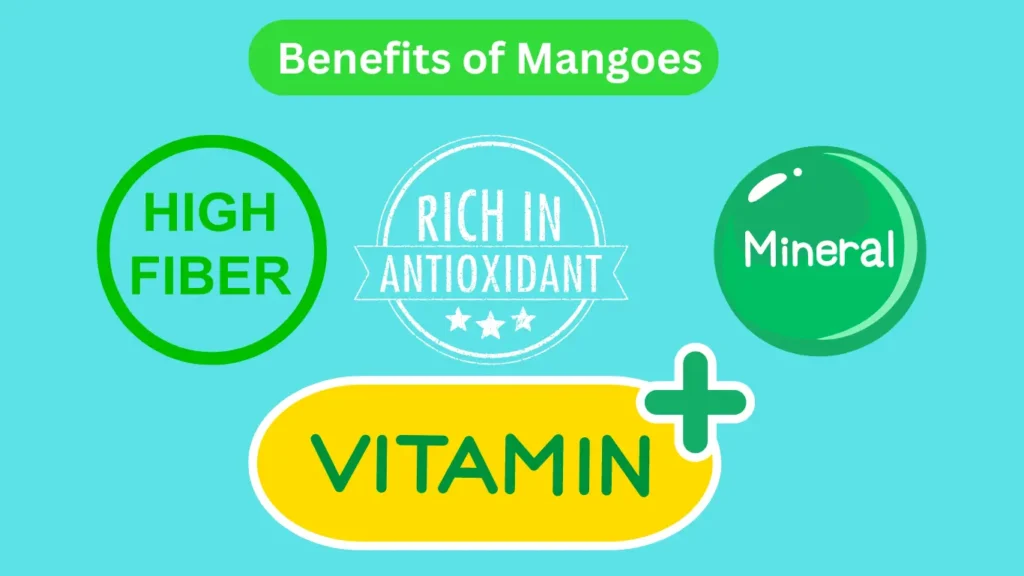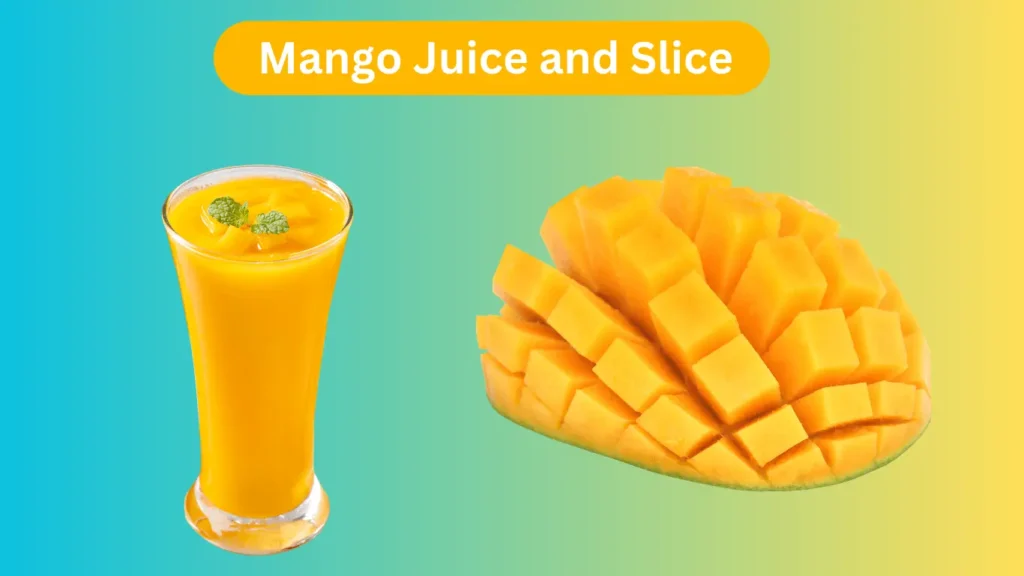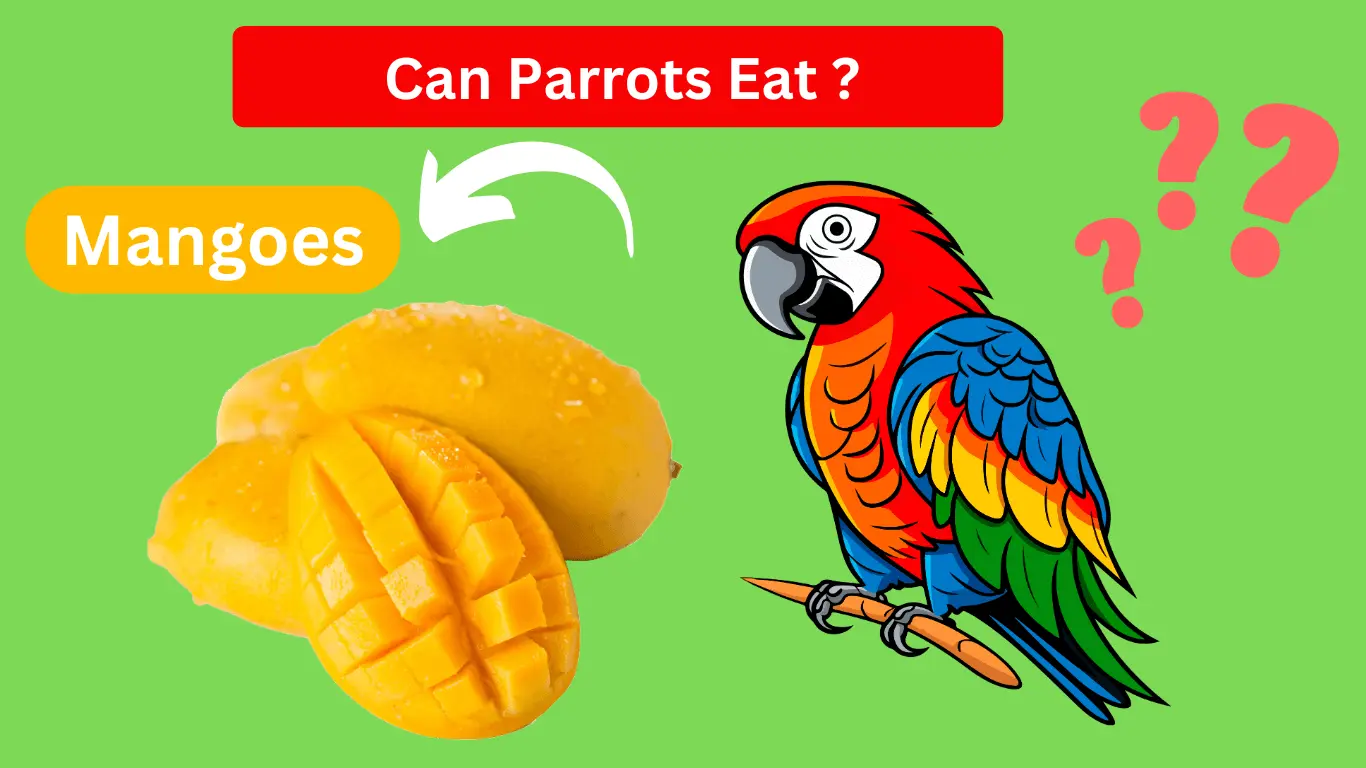Your parrot can safely eat a few pieces of mango as a snack or special treat. Mangoes have several nutritional benefits, but they also contain many vitamins and minerals. ‘Can parrots eat mango?’ To answer this question and offer further detail about the mangoes as a food source for parrots, as well as the possible dangers that come with it, and how it could be prepared and served to these lovely pets, this article will outline all of it.
We must provide a proper diet to our birds to have proper food for them. Parrots are bright colorful birds and smart in their actions; however, they require specific types of food to maintain their health.
Table of Contents
Nutritional Benefits of Mangoes
Mangoes contain nutrients that can be useful to parrots. Here are some of the key nutritional components of mangoes:

- Vitamins: Mangoes contain vitamins especially Vitamin C and Vitamin A which help boost of immune system sharpen vision and give you a healthy skin complexion.
- Minerals: Mangoes are known to contain certain minerals for instance potassium and magnesium. Potassium herein assists the body in regulating blood pressure and heart rate while magnesium is important for muscle and nerve functions.
- Antioxidants: Mangoes also contain a lot of antioxidants such as beta-carotene that assist in the fight against free radicals and illness.
- Fiber: Mangoes contain Dietary fiber and this is a known fact that dietary fiber helps in digestion and prevents constipation.
Are Mangoes Safe for Parrots?
In general, it is not toxic to parrots yet it should be given as a treat not as a regular meal and in limited quantity. No complications arise with these birds when being fed these foods and they are fit for consumption by the birds. However, there are several considerations to keep in mind to ensure the fruit is provided safely:
Pesticides and Chemicals: Before using non-organic mangoes then ensure that you wash them well since some parrots might be affected by the pesticides or chemicals used in growing the fruits.
Portion Size: Mangoes become the right product type to use occasionally as an extra meal rather than assuming it to be a routine meal type. The mangoes should also not be given beyond the recommended portion since they also have nutrients that if taken in large quantities are poisonous.
Preparation: Before giving the mango to your parrot you should try and remove the pit of the mango and dispose of it. The pit may block the throat thus causing choking and may also lead to stomach upset.
How Often Can I Feed Mango to My Parakeet?
To ensure your parrot enjoys mango safely, follow these guidelines:
Wash Thoroughly: Under the tap, wash the mango keeping in mind that you have to wash off any residue left on the fruit.
Remove the Pit: The next step is to take out the pit and dispose of it then clean up around it very well to ensure you make a clean slice. DO NOT give your parrot the seed but only the fleshy part of the mango noting that the outer hard casing is dangerous for the bird.
Cut into Small Pieces: Mango should be chopped into tiny pieces so as not to cause choking of the food to your parrot and also to offer it in a way that will be able to feed himself.

Moderation is Key: Address and recommend mango to be taken in small portions and as supported by other fruits and foods. This is good actually; a couple of small portions a couple of times in a week should do the trick.
Potential Risks of Feeding Mango to Parrots
While mangoes offer many health benefits, there are some potential risks to be aware of:
High Sugar Content: Mangos have natural sugar if provided to your conure in large portions containing mangos, they will result in obesity and diabetes. One should also monitor parrot’s proportions and exaggerated sizes such as weight examining them on a daily basis.
Digestive Issues: In other words, most foods that you introduce to your parrot regardless of the food are likely to cause the tummy to upset the bird. First, try giving the parrot little portions of food and observe the response of the parrot to the type of food offered to it.
Allergic Reactions: However, it should be understood that certain varieties of parrots have an adverse reaction to mangoes even though such cases are rare. Such symptoms may include itchiness, inflammation, or any alteration in activity or behavior and this is an indication that the dog should be returned to the vet.
Conclusion
In conclusion therefore it has been found that mangoes are quite safe and healthy food that can be taken by parrots, provided it is taken in the right measures and the right manner. They offer numerous health benefits, however, they have low nutritive value and can supply only a limited amount of a given nutrient besides which they should not be monotonous. Every Parrot breed like budgies, quaker parrots, parakeets, macaws, and also lovebirds can eat mangoes. So, it is possible to enhance the diet of your pet by adding this delicious fruit of the tropics to the parrot’s ration knowing the main threats that are connected with it and having studied some elementary rules of usage.
FAQs
Is mango toxic to parrots?
Mangoes are not toxic to parrots, but there are important considerations to ensure they are fed safely.
Is mango safe for budgies?
Yes, mango is OK for budgies but give in moderation amount that is safely consumed by budgies.
Can birds eat mangoes?
Yes, the mangoes are safe and can be given to many of the Birds and they should find it quite enjoyable. But some factors should be taken into consideration in order to gain the healthy impact mangoes can bring to their foods.
Can parrots eat mango skin?
Parrots can eat mango flesh, but mango skin is a bit more problematic.
Can parrots eat mango seeds?
No, Parrots should not eat seeds because mango seeds are large, hard, and can pose a choking hazard.
Can parrot eat mango juice?
Conures can have mango juice, but it’s important to be cautious because Mango juice contains high sugar which creates issues for birds’ health.
Can Lovebird Eat mango?
Yes, lovebirds can eat mangoes, but with some precautions. Mango is a healthy fruit that provides essential vitamins and nutrients, but it should be offered in moderation. but mangoes for parakeets also Flesh Only, Fresh and Clean.
Can parrots eat mango trees?
Green cheek should not eat parts of a mango tree because it contains toxicity, Pesticides, and Chemicals.

Abubakr is a passionate parrot enthusiast based in Pakistan. He shares his life with his vibrant parrot, Peto, and is dedicated to understanding parrot nutrition, behavior, and training. Through his experiences with Peto, Abubakr aims to gain a deeper insight into the needs and personalities of parrots and to share his knowledge with fellow parrot lovers. With a focus on the nutrition of conures, Abubakr is excited to connect with like-minded individuals and learn from their experiences.

I have to thank you for the efforts you have put in penning this
blog. I am hoping to see the same high-grade blog posts by you later on as well.
In fact, your creative writing abilities has motivated me to get my own blog
now 😉